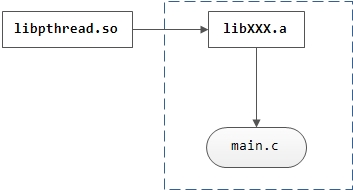静态库链接动态库时,如何使用该静态库
文章转载自:
1. 静态库链接动态库
网上有各种静态库的创建与使用的例子,但都是超级简单的例子,比如静态库就直接来个printf()就完事了!其实实际使用时,静态库会复杂很多, 比如会调用很多其他的动态库。
下图就是个例子:

假设libXXX.a用了libpthread.so的函数pthread_create(),那libXXX.a在链接时,有没有把pthread_create()函数copy到自己身上,使其完全独立?main.c在链接时,只需要链接libXXX.a,还是连libpthread.so也要链接?这就是本文要讨论的内容。
为了证实问题,我们写个测试程序吧。一个是libXXX.a,一个时main.c。
1.1 静态库文件libXXX.a源代码
1) static_lib_example.h
//static_lib_example.h
#ifndef STATIC_LIB_EXAMPLE_H_INCLUDED
#define STATIC_LIB_EXAMPLE_H_INCLUDED
int testFunc(int x);
#endif
2) static_lib_example.c
//static_lib_example.c
#include "static_lib_example.h"
#include <stdio.h>
#include <pthread.h>
/* this function is run by the second thread */
void *thread_exe(void *x_void_ptr)
{
/* increment x to 100 */
int *x_ptr = (int *)x_void_ptr;
while(++(*x_ptr) < 100);
printf("x increment finished\n");
return NULL;
}
int testFunc(int x)
{
printf(" testFunc %i\n",x);
pthread_t inc_x_thread;
int y;
/* create a second thread which executes thread_exe(&y) */
if(pthread_create(&inc_x_thread, NULL, thread_exe, &y)) {
fprintf(stderr, "Error creating thread\n");
return 1;
}
return 0;
}
一个头文件,一个原文件,很简单。好吧,然后得来个Makefile
3) Makefile文件
#chenxf make file
#some notice
#target: prerequisites - the rule head
#$@ - means the target
#$^ - means all prerequisites
#$< - means just the first prerequisite
OUT_LIB = libstatic_lib_example.a
LIB_SRC := static_lib_example.c
TEMP_O := static_lib_example.o
$(TEMP_O): $(LIB_SRC)
@gcc -c -o $@ $^
all: $(OUT_LIB)
$(OUT_LIB): $(TEMP_O)
@ar rcs $@ $^
clean:
@rm -r *.a *.o
其实Makefile相当于2句命令。所以你不写Makefile,敲下面2句command也行:
gcc -c static_lib_example.c -o static_lib_example.o
ar rcs libstatic_lib_example.a static_lib_example.o
好了,编译结果如下:
# ls
libstatic_lib_example.a Makefile static_lib_example.c static_lib_example.h static_lib_example.o
1.2 调用静态库的程序main.c源代码
我们就写一个main.c,它会链接libstatic_lib_example.a,并调用函数testFunc(int x):
//main.c
#include "static_lib_example.h"
int main(int argc, char* argv[])
{
testFunc(100);
return 1;
}
1.3 编译main.c的情况分析
编译main.c(只需要一个命令,就不写Makefile啦):
# gcc -g -O3 -Wall main.c -o main -I/home/chenxf/static_lib_sample/ -L/home/chenxf/static_lib_sample/ -lstatic_lib_example
-
-I表示头文件路径 -
-L表示库的路径,即libstatic_lib_example.a的路径
上面的命令,表示main程序,只链接静态库libXXX.a。
编译结果:
/home/chenxf/static_lib_sample/libstatic_lib_example.a(static_lib_example.o):在函数‘testFunc’中:
static_lib_example.c:(.text+0x86):对‘pthread_create’未定义的引用
static_lib_example.c:(.text+0xd4):对‘pthread_join’未定义的引用
collect2: error: ld returned 1 exit status
出错啦!!!!!!
在main.c链接的时候,说找不到pthread_create了!
看来,静态库libXXX.a并没有把动态库的函数copy到自己身上,只留了符号表,所以main.c要用libXXX.a时,还必须链接动态库libpthread.so。也就是:
gcc -g -O3 -Wall main.c -o main -I/home/chenxf/static_lib_sample/ -L/home/chenxf/static_lib_sample/ -static -lstatic_lib_example -lpthread
ps: libpthread.so在默认的系统库目录/usr/lib,不需要再写-L/usr/lib/
这样一写,就OK啦!编译就成功了!
我们还可以用 nm 工具,来确认libXXX.a到底有木有把pthread_create()函数copy到自己身上。
# nm libstatic_lib_example.a
static_lib_example.o:
U fwrite
U printf
U pthread_create
U pthread_join
U puts
U stderr
0000000000000040 T testFunc
0000000000000000 T thread_exe
U表示仅仅调用,而没有定义。也就是该库并不独立,而是依赖于其他库,比如libpthread.so

